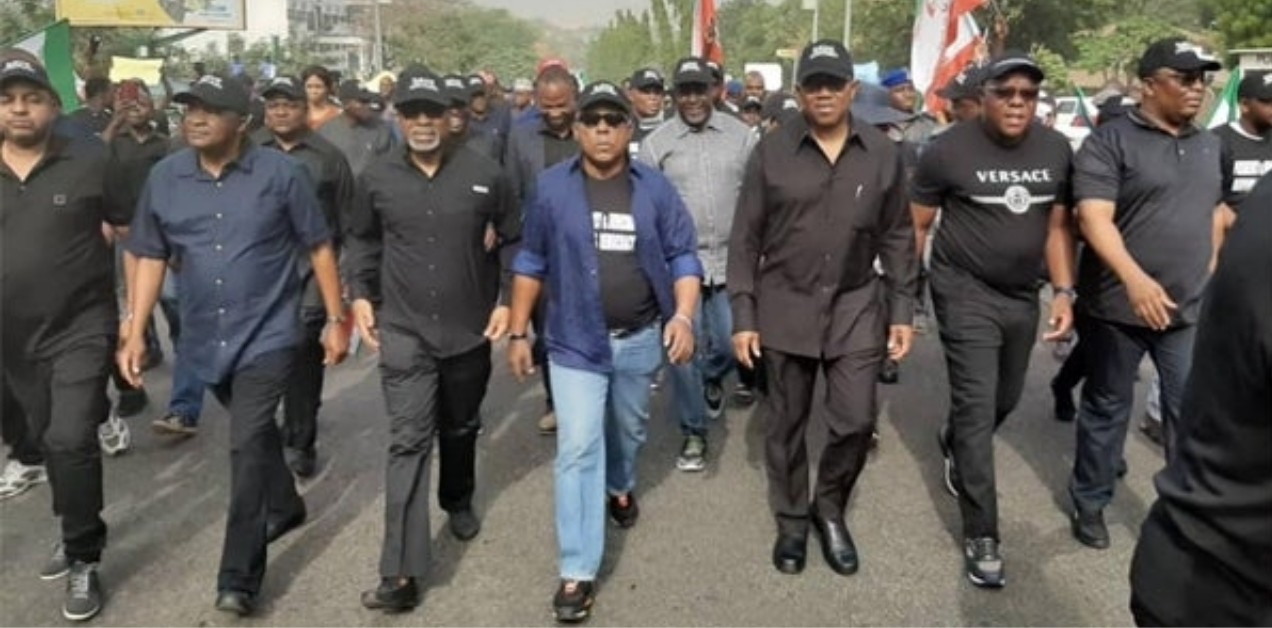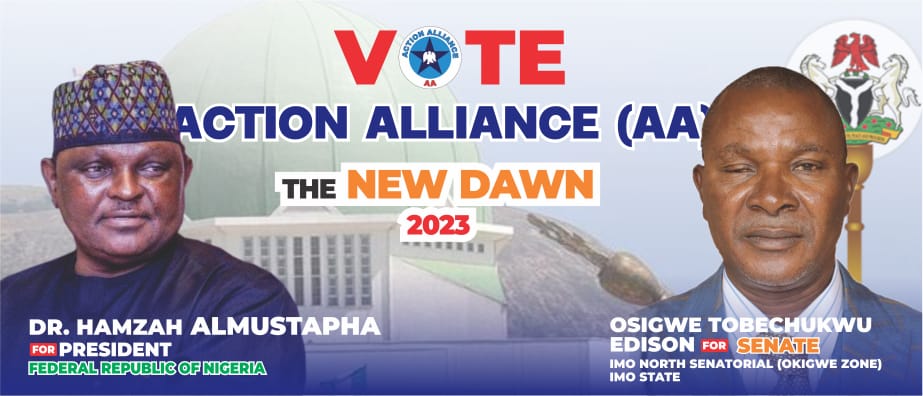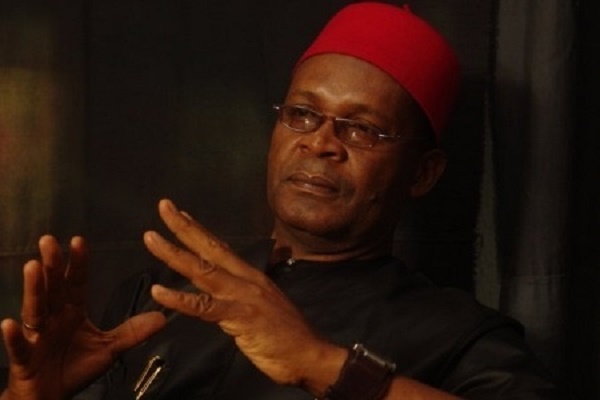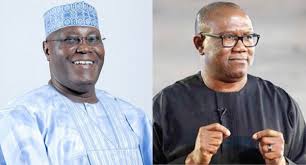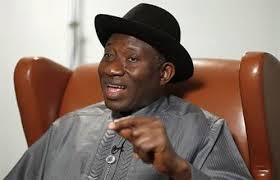…As PDP stalwarts protest in Abuja
More legal experts have continued to extrapolate facts and figures on the Supreme Court judgment that awarded governorship of Imo State to Senator Hope Uzodinma against the seating governor, Mr. Emeka Ihdioha last week Tuesday evening.
This is as the leadership of the Peoples Democratic Party (PDP) Monday protested against the Supreme Court ruling which recalculated the total votes cast to overshoot the total number of accredited voters in the March 23, 2019 governorship election.
Otherwise, in continuation of its call for the review of the Jan. 14, Supreme Court judgment on Imo governorship elections, the PDP took its protest to the Eagle Square, Abuja, on Monday. The protest which started at the PDP’s Legacy House to the Three Arms Zone was led by the PDP National Chairman, Prince Uche Secondus
In their submission, Vice Presidential candidate and former Governor of Anambra State, Mr Peter Obi and Party chairman, Prince Secondus called for a review and reversal of the judgment to avoid making mockry of the judiciary using wrong results computation.
On grounds for the Supreme Court to revisit its ruling, an analyst makes reference on how the Supreme Court can overrule self on matters of proven injustice.
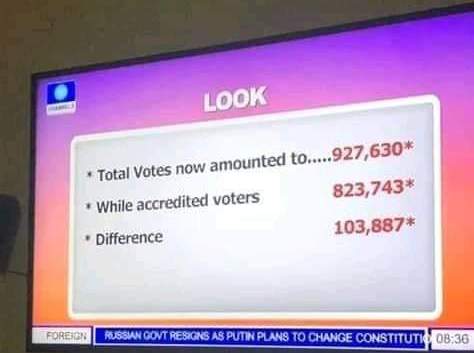
The lawyer, who pleaded anonymity, recalled that in his lead judgment in Adegoke Motors Ltd. v. Adesanya [1989] 13 NWLR (Pt.109)250 at page 275A, Justice Chukwudifu Oputa JSC, as he then was, said: “We are final not because we are infallible; rather we are infallible because we are final. Justices of this Court are human-beings, capable of erring. It will certainly be short sighted arrogance not to accept this obvious truth.”
“It is also true that this Court can do inestimable good through its wise decisions. Similarly, the Court can do incalculable harm through its mistakes.”
“When therefore it appears to learned counsel that any decision of this Court has been given per incuriam, such counsel should have the boldness and courage to ask that such a decision be over-ruled.”
“This Court has the power to over-rule itself (and has done so in the past) for it gladly accepts that it is far better to admit an error than to persevere in error.”
40 REASONS WHY SUPREME COURT OF NIGERIA SHOULD REINSTATE IHEDIOHA IN IMO STATE
By Ogubundu Nwadike, M.A
- His Excellency, Rt. Hon. Emeka Ihedioha campaigned very well across Imo State and became a household name in Imo State for the 2019 election.
- No other contestant campaigned in Imo State in the real sense of campaigning and none is a household name as Ihedioha.
- Gov. Ihedioha secured the highest number of votes cast in the election, 273,404, winning outrightly in 12 local government areas and Performing relatively well in other 15 local government areas.
-
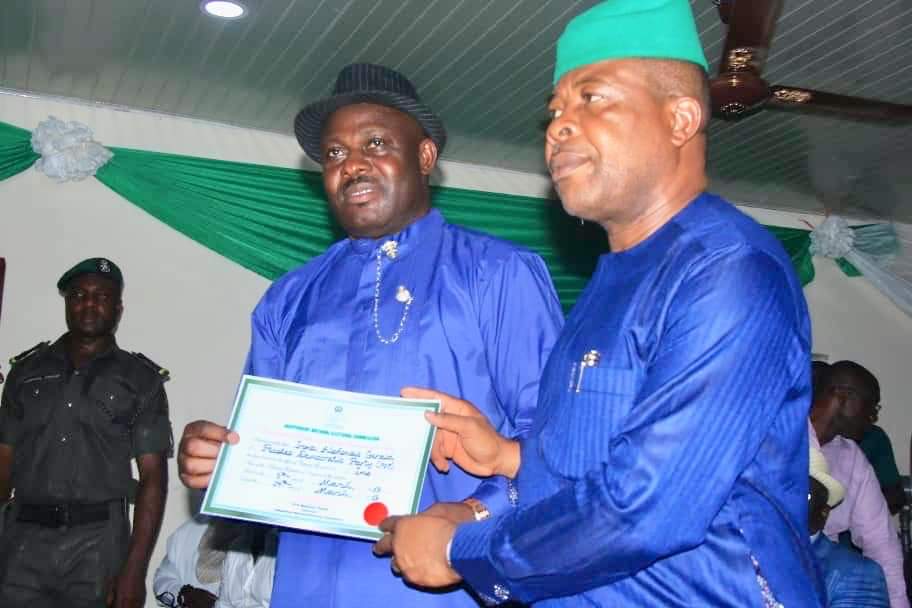
Imo State Governor-Elect, Hon Emeka Ihedioha and his deputy, receiving their certificate from INEC INEC declared Ihedioha the governor-elect on their set standard and reasons of his higher number of votes over the other candidates.
- Three of the candidates in the election made petition to the Tribunal seeking for cancellation of the election, rerun election, and addition of excluded votes from 388 polling units.
- The Tribunal after full five months of hearing the petition dismissed it for lack of merit and competence, because none of the petitioners could prove his claims.
- The claim of exclusion of votes from 388 polling units turned out to be the most dramatic petition of all because nobody including the petitioner and his witnesses could prove the locations of the 388 polling units and the votes cast in them.
- The INEC on oath pointedly disclaimed the 388 polling units, stating that they as electoral umpires didn’t know anything about the polling units.
- The petitioners, not satisfied with the ruling by the Tribunal, appealed it at the Court of Appeal.
- The appeal by the candidate making claims to excluded votes from 388 polling units was once again dramatic as the petitioner could still not provide evidence and proof of the existence of the 388 polling units, there locations and total number of votes cast in them. He could also not show the number of votes got by the various candidates in the election.
- After full two months of work on the appeal, the Court of Appeal ruled that the Tribunal was right in its judgement and upheld the election of Gov. Ihedioha as due and legal. Therefore, the appellate court dismissed all the appeals.
- The petitioners/appellants took their matter to the Supreme Court.
- While in the Supreme Court, one of the candidates was disqualified by the Supreme Court on a separate matter bothering on double-nomination candidacy. That candidate was proved beyond reasonable doubts to have run the election with the nomination and candidature of two different parties. That candidate got 190,364 votes in the election. His votes were consequently expunged by INEC.
-
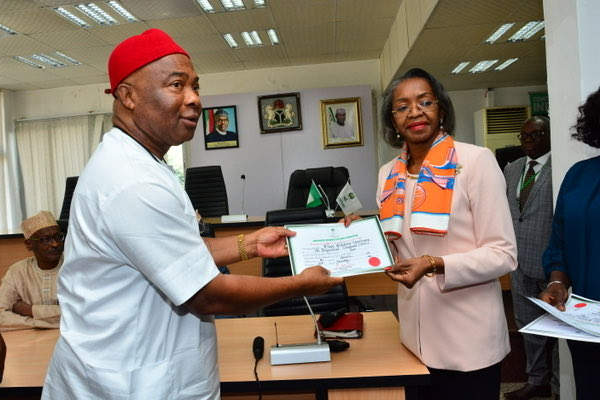
New Governor of Imo State, Senator Hope Uzodinma receiving his certificate of return from INEC in Abuja ahead of swering in However, there was another candidate that ran the election on the nomination of the same party for which the other candidate was disqualified. This raised the debate on whether it was the candidate that was disqualified or his party in the election. Could a party nominate and present two candidates for the same position in the same election? The popular answer was in the negative.
- When, on January 15, 2020, the Supreme Court was to deliver its judgement on the appeals, it upheld the one party two candidate’s regime and went on to rule that the same controversial candidate won the election.
- The Supreme Court based its judgement on its reasoning that the Tribunal and Court of Appeal aired in law by dismissing the claim by the petitioner/appellant that his votes from 388 polling units were excluded.
- The Supreme Court went on to award 213,258 votes to the petitioner/appellant as his votes that were excluded from the 388 polling units.
- The candidate that the Supreme Court awarded the 213,258 votes was fourth in the March 9, 2019 having got 96,456 votes. Together therefore, he ended getting 309,714 votes.
- The notion of the total number of votes from the 388 polling units as 213,258 was first heard in the Supreme Court judgement.
- The Tribunal and Court of Appeal didn’t know about the 213,258 earlier because the claimant couldn’t prove anything about the 388 polling units and his claimed excluded votes.
- The petitioner/appellant that the Supreme Court judgement favoured based on the supposed excluded 213,258 votes never knew how many votes he was claiming from the 388 polling units.
- It is still a burning issue now how the Supreme Court counted and got to know that the excluded votes were 213,258 without the prior knowledge of INEC, the electoral umpires and the petitioner himself.
- It is also contentious how it was only the 388 polling units excluded votes petitioner that the Supreme Court awarded 213,258 votes without a single vote to any of the rest of the 69 contestants in the election.
- The question now is, was it only the candidate that the Supreme Court awarded 213,258 votes to that got votes in the 388 polling units? Is that humanly possible?
- The petitioner and his witnesses at the Tribunal and Court of Appeal couldn’t read the document he presented, that was not certified or confirmed by INEC any way.
- How then was the Supreme Court able to read the document and determine the total number of votes as 213,258, which the Tribunal for five months could not read and determine the total number of votes from the 388 polling units?
- The whole unilateral mathematics by the Supreme Court that led to their awarding 213,258 controversial supposed excluded votes turned out to have produced wrong answers.
- The total number of accredited voters in the governorship election in Imo State in 2019 was 823,743 but with the Supreme Court’s wrong mathematics, the total number of votes cast rose to 950,952, leaving an excess of 127,209 votes that were not accredited.
- From the wrong mathematics answer by the Supreme Court, the 388 polling units produced 213,258 votes for only one candidate. That gave an average of 550 votes per polling unit.
- The law is that the maximum number of voters in each polling unit is 500. But in the controversial 388 polling units, each had 550 for only one candidate. When the votes got by the other candidates are added, the total number of voters in each polling unit among the 388 polling units will be more than 550 votes. That’s outrageous!
- From the foregoing, the Supreme Court need to help Nigerians clarify the confusions over the contentious judgement it gave on January 15, 2020!
- The respondent that was returned as duly elected by the people of Imo State with the highest number of validly cast votes, certified and confirmed by the INEC, the Tribunal and the Court of Appeal, Gov. Ihedioha, promptly rejected the judgement by the Supreme Court.
- The Peoples Democratic Party (PDP) has since also stated it rejects the judgement by the Supreme Court and called for its reversal to reinstate their candidate who was the authentic winner of the election.
- Apparently, the Supreme Court played politics with justice, dabbling into aspects of judicial process that was not within its jurisdiction to deliberate on, like counting of votes that were claimed by a candidate to have been excluded in an election.
- The Supreme Court has questions to answer over its delivery of injustice instead of justice in the appeals brought before it by petitioners in the 2019 governorship election, clearly won by Gov. Emeka Ihedioha.
-
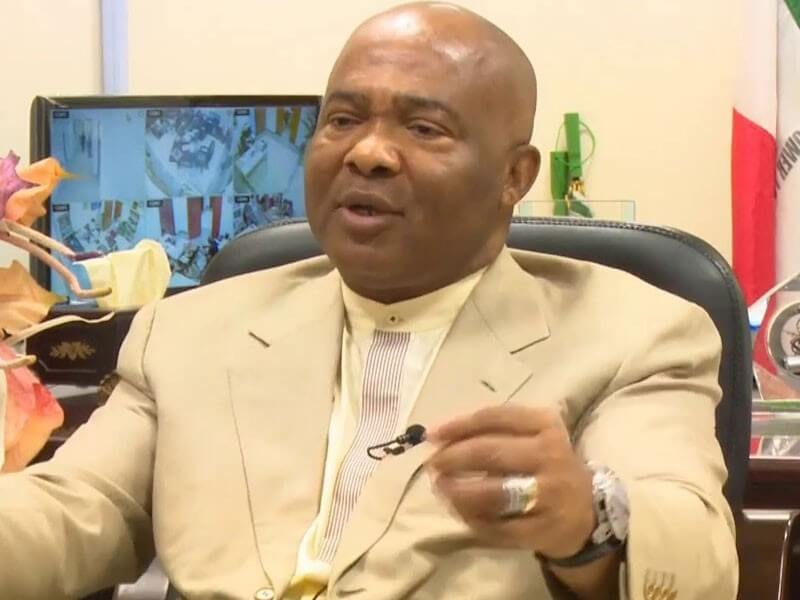
Senator Hope Uzodinma, Governor of Imo State Were there any 388 polling units in the election whose votes were excluded? In what places were the 388 polling units located?
- Were there any votes cast in the 388 polling units? Where are the result sheets as were had in and for other polling units in the same election?
- If the Supreme Court judgement winner got 213,258 votes from the 388 polling units, what were the votes of the other candidates? Or was the election in the 388 polling only for the Supreme Court judgement winner alone?
- If the total number of accredited voters was 823,743, how come there were 950,952 votes cast in the election after the Supreme Court awarded 213,258 votes to its winner?
- After disqualifying a candidate for double-nomination candidacy, should the party he represented still have another candidate that was not duly recognized by INEC, the electoral umpires?
- After the disqualification of a candidate from the election for irregularities of culpable complicity for double-nomination candidacy, with his votes expunged, did Gov. Ihedioha automatically secured required 25% votes in 22 local government areas or not?
- Legal jingoism and established errors and mistakes of the Supreme Court judgement notwithstanding, the foregoing are few cogent reasons why Gov. Ihedioha should, as a matter of fact, be reinstated without further delays, if the Supreme Court still has the interest of sustainable democracy and the respectable judiciary in Nigeria at heart.
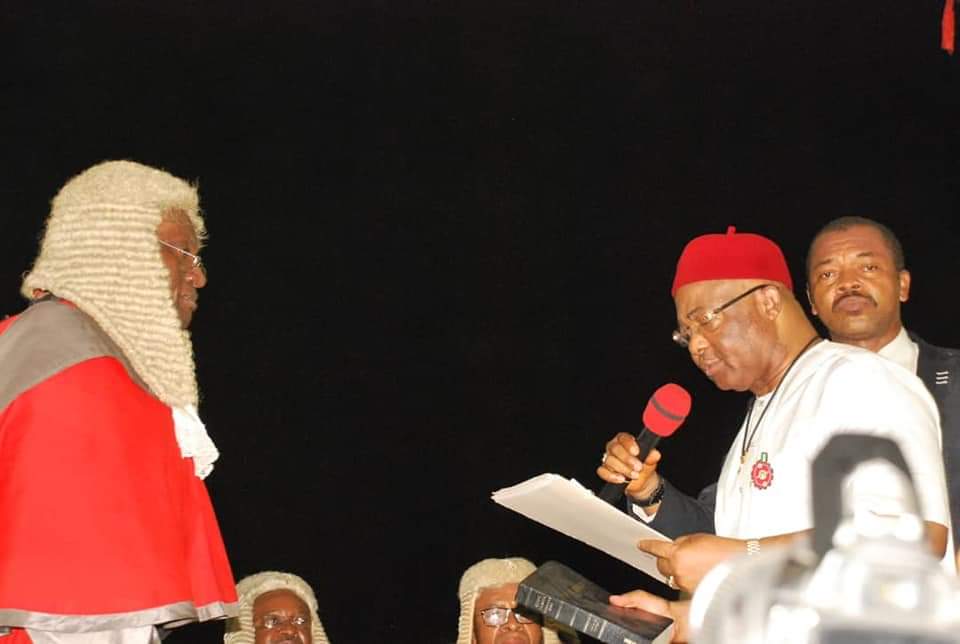
Thank you.

